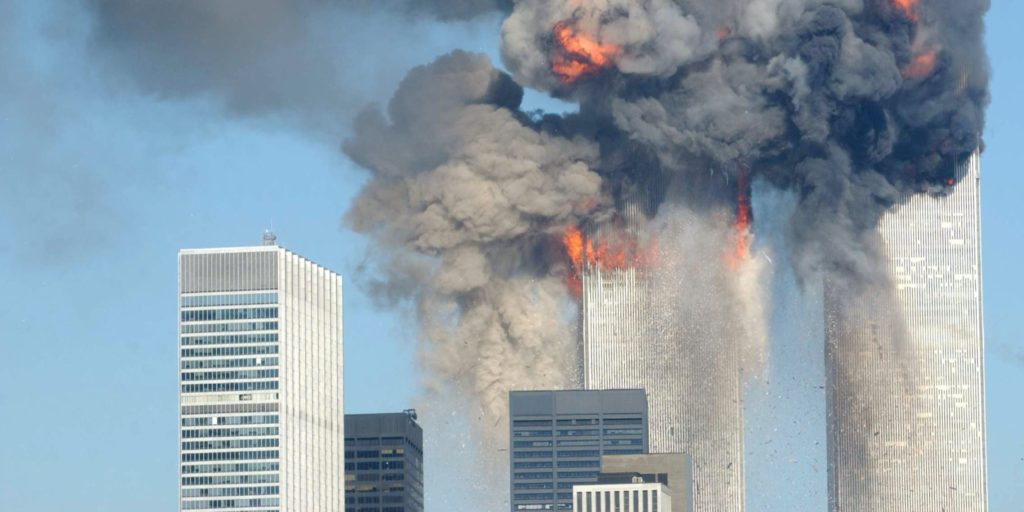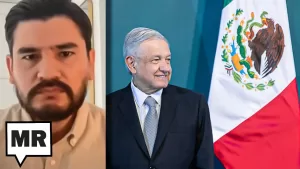❈ ❈ ❈
3,000 Dead on 9/11 Meant Everything. 200,000 Dead of Covid-19 Means Nothing. Here’s Why.
Jon Schwarz
Lots of people have ridiculed President Donald Trump for telling journalist Bob Woodward that he “wanted to always play [Covid-19] down … because I don’t want to create a panic.” That’s hilarious, because Trump obviously loves creating panics — about Mexican immigrants, antifa, single-family zoning, and, scariest of all, low-flow toilets.
But Trump was, as he often does, telling us by accident something profound about American politics.
Nineteen years ago today, a group of men from Saudi Arabia, Egypt, Lebanon, and the United Arab Emirates hijacked four passenger jets. They successfully flew three of them into the World Trade Center and the Pentagon. All in all, they murdered 2,977 people in one day.
By March 19, the day Trump explained his reasoning to Woodward, the Centers for Disease Control and Prevention had already predicted that the coronavirus would kill hundreds of thousands of Americans and possibly as many as 1.7 million.
In the first situation, George W. Bush, then the president of the United States, actively fomented panic. Americans could not sleep safely in their beds unless we invaded Afghanistan. The FBI should be able to obtain the bank records or internet activity of citizens anytime it wanted without a warrant. Saddam Hussein was hiding anthrax in his mustache.
In the second situation, one that was objectively much more frightening, the president of the United States openly acknowledged that he played the danger down. This goes not just for the danger of Covid-19 itself: His administration has also played down the continuing economic danger to tens of millions of Americans.
What accounts for the glaring disparity in reactions?
History shows the answer is as obvious as it is bizarre: Reality often has nothing to do with gigantic government actions. Instead, politics is mostly about illusions that leaders strive to create inside our heads.
In the case of 9/11, the Bush administration did not attempt to respond rationally to the actual events. Instead, they used it as a justification to do what they had always wanted to do but couldn’t get away with. An influential think tank, the Project for a New American Century, had explained the year before that “the United States has for decades sought to play a more permanent role in Gulf regional security,” a goal that “transcends the issue of the regime of Saddam Hussein.” Then-Secretary of Defense Donald Rumsfeld told an aide just hours after American Airlines Flight 77 plowed into the Pentagon that he wanted to “go massive — sweep it all up, things related and not,” including Iraq if possible. Both Bush and his national security adviser, Condoleezza Rice, soon explained that they saw 9/11 as an “opportunity.”
By contrast, Covid-19 really did demand a large-scale government response, but there was little that Trump wanted to do. So Trump has delivered hours of a TV show in which he starred, but not enough PPE for doctors and nurses, or contact tracing, or desperately needed funding for states and cities, and people thrown out of work. Bush wanted a pretext to do a lot of things that were unnecessary, such as invading Iraq, while Trump wanted an excuse to do nothing when, in fact, a lot really needed to be done.
Any look at history shows that this is how the world works. Governments decide what they want to do, and then search for some public rationale.
On December 16, 1989, Panamanian troops shot a U.S. soldier and threatened to rape the wife of a Navy officer. But in the world of political illusion, President George H.W. Bush explained that this meant that we had to invade Panama, which we did, killing hundreds or thousands of people (the precise toll is disputed). An anonymous member of Congress accurately said at the time that “the December 16 incidents were the excuse, and not the reason, for the invasion.” There was no actual connection between the attack on Panama and what had happened to the American troops, which would have been totally ignored if Bush hadn’t wanted a war to oust the country’s military leader, Manuel Noriega, who had once been a CIA asset but had turned into an antagonist to U.S. interests.
On August 2, 1964 the U.S.S. Maddox exchanged fire with North Vietnamese ships in the Gulf of Tonkin. No U.S. sailors were killed; the Maddox suffered a single bullet hole. Then on August 4, nothing at all happened, although the U.S. dreamed up an imaginary second attack on the Maddox. In the world of political illusion, the U.S. used these events as justification to escalate a war that ended up killing millions of people in Indochina.
This isn’t just an American thing.
In April 1980, members of Islamic Dawa, an Iraqi Shia organization opposed to Saddam and backed by Iran, threw a grenade at Tariq Aziz, the deputy prime minster of Iraq. According to Saddam, this meant that Iraq had to go to war with Iran, which it did, leading to the deaths of a million people on both sides.
In June 1982, Palestinian terrorists attempted to assassinate the Israeli ambassador to the U.K. in London. According to Israel, this meant that it had to invade Lebanon, leading to the deaths of thousands and the Sabra and Shatila massacre.
In September 1938, Herschel Grynszpan, who was Jewish, shot a German diplomat in Paris. According to the Nazi Party’s SA paramilitaries, this required them to carry out Kristallnacht.
Today more than any other, we should understand how much Trump’s berserk honesty tells us about life on earth. Our lives have value insofar as the powerful can use them to create whatever “panic” they desire. If not, we Americans will die quietly in a void, as a thousand of us are currently doing every day from Covid-19.
(Jon Schwarz writes for The Intercept, an award-winning news organization dedicated to holding the powerful accountable through fearless, adversarial journalism. Jon Schwarz has contributed to many publications and also worked for Michael Moore’s Dog Eat Dog Films. Article courtesy: The Intercept.)
❈ ❈ ❈
Nearly Two Decades After 9/11, Military-Industrial Complex Is Stronger Than Ever
C.J. Atkins
It has been almost 20 years since Al Qaeda terrorists flew hijacked planes into the World Trade Center and the Pentagon and crashed another into a field in Pennsylvania after a passenger revolt. On that day, 2,977 people lost their lives, leaving behind hundreds of thousands of grieving family members, friends, co-workers, and neighbors. First responders in the immediate target cities and volunteers from around the country courageously rushed to aid those in need, coming together in a moment of national unity unmatched since perhaps Pearl Harbor.
Today, the country is again living through a disastrous tragedy. It is one that emerged outside our borders but which has been made immeasurably worse by the failed response of our country’s leader. The COVID-19 pandemic, thanks to Trump’s lies and incompetence, has claimed over 193,000 American lives as of Sept. 11, 2020. That’s more than 65 times the number of people who perished on 9/11. When this nightmare finally ends, someday, tens of millions will count themselves among those who’ve lost someone to the virus.
Besides the shared death and human destruction that characterize these two periods, they’re also defined by something else—both represent a time of huge wins for the military-industrial complex. In the aftermath of the Sept. 11 attacks, war profiteering exploded as the administration of George W. Bush forked over billions of dollars to giant defense corporations (whose former heads populated his cabinet). Now, Trump is doing the same.
Military merger mania
The current occupant of the White House tries to play the role of an isolationist, anti-war president, constantly pledging to “bring our troops home” from this or that military adventure. He rails against his predecessors for pursuing policies of endless war. He even made the stunningly correct criticism this week that Pentagon leaders “want to do nothing but fight wars so that all of those wonderful companies that make the bombs and make the planes and make everything else stay happy.”
His fawning sycophants have tried to paint Trump as picking up the mantle of President Dwight D. Eisenhower, who nearly 60 years ago issued the grim warning that the “conjunction of an immense military establishment and a large arms industry” represented the rise of “misplaced power,” endangering liberty and U.S. democratic processes.
Trump’s unconvincing act as an anti-militarist is clearly just a re-election show, a charade meant to hold onto blocs of voters he sees slipping from his camp. It’s intended to distract from his shameful comments calling U.S. veterans and enlisted troops “suckers” and “losers.” His fresh “attacks” on the military brass are offered as supposed proof that the president is loyal to and looking after the rank-and-file soldiers he actually holds in clear disdain.
Placing any faith in the idea that Trump is the one to fight back against the marriage of weapons dealers and government defense officials is about like trusting him to protect us all from health insurance companies when it comes to pre-existing conditions. There’s a reason thieves aren’t hired to guard bank vaults.
Under Trump, the merger mania between the Pentagon and the top arms manufacturers is on a scale that may overshadow even that of the Bush administration in the years before and after 9/11. All of Trump’s defense secretaries—he’s had three so far—have been hand-picked straight from the defense industry. Gen. Jim Mattis was on the board of directors of General Dynamics, which specializes in aerospace weapons and nuclear submarines. Pat Shanahan served as an executive with Boeing, maker of warplanes. And current defense chief Mark Esper was top lobbyist for Raytheon, the company that makes the cruise missiles Trump fired into Syria.
According to the Project on Government Oversight, almost 50% of senior officials in the U.S. Department of Defense are connected, in one way or another, to defense contractors. The people making decisions on the purchase of weapons and foreign policy today are the same ones who were selling the government armaments yesterday.
This president fought for defense budgets during his time in office that have blown past all previous records. Twice so far, he has signed war budgets totaling over $700 billion each. He’s preparing to sign a third soon. He regularly appears on television with tanks and bombers as his backdrops, brags about the U.S.’ ability to destroy other nations, and longs to have big military parades that make him look like the dictators he so admires.
Regardless of what Trump might say to score votes, no one should expect that any of this is going to change if he’s re-elected. For proof of that, just look at how the defense industry is reacting to the president’s bluster this week. On industry official anonymously told Politico, “He has a really long history of really pushing the defense industry forward and bragging about large defense budgets and talking about F-35s and rockets and things like that, so I just don’t think anyone thinks there’s a lot of reality behind what he’s saying.”
Wall Street, where arms stocks bring big profits, isn’t breaking a sweat either. Byron Callan, a defense market analyst, said he hasn’t “gotten a call…from anyone who is like, ‘Oh my god, Byron, should I sell all my defense stocks?” Callan says Trump’s statement “makes no sense,” and that he imagines the president could “flip 180 degrees in a week.”
Profits of death
In the 1980s, the U.S. government funneled weapons and money to Islamist fundamentalists in Afghanistan in a proxy war against the Soviet Union. The CIA succeeded in destroying that country’s experiment in democracy and socialism, but it also ended up creating the very force that would come back to hit America on Sept. 11, 2001. During both the earlier Cold War and in the “War on Terror” that destroyed Afghanistan and Iraq after 9/11, the military-industrial complex raked in the cash.
Millions died along the way, casualties of the drive for war profits. But no lessons were learned.
The bonanza continues under Trump. This president has essentially handed the Pentagon over to the top executives of companies that specialize in producing weapons designed for no other purpose than human destruction. Money that could be going to so many public priorities—especially the Medicare for All health system that COVID has shown us we so desperately need—is instead funneled into private pockets.
The greatest national security threat the people of the United States face today resides inside the White House. Fortunately, there is a weapon which all of us can use to defend ourselves against this danger—our ballots.
(C.J. Atkins is the managing editor at People’s World. People’s World is a voice for progressive change and socialism in the United States.)




